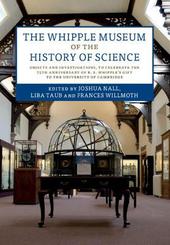
|
The Whipple Museum of the History of Science: Objects and Investigations, to Celebrate the 75th Anniversary of R. S. Whipple's G
Hardback
Main Details
| Title |
The Whipple Museum of the History of Science: Objects and Investigations, to Celebrate the 75th Anniversary of R. S. Whipple's G
|
| Authors and Contributors |
Edited by Joshua Nall
|
|
Edited by Liba Taub
|
|
Edited by Frances Willmoth
|
| Physical Properties |
| Format:Hardback | | Pages:352 | | Dimensions(mm): Height 253,Width 178 |
|
| Category/Genre | Exhibition catalogues and specific collections
History
History of science |
|---|
| ISBN/Barcode |
9781108498272
|
| Classifications | Dewey:502.84 |
|---|
| Audience | | Professional & Vocational | |
|---|
| Illustrations |
4 Tables, black and white; 2 Maps; 59 Halftones, black and white; 2 Line drawings, black and white
|
|
Publishing Details |
| Publisher |
Cambridge University Press
|
| Imprint |
Cambridge University Press
|
| Publication Date |
22 August 2019 |
| Publication Country |
United Kingdom
|
Description
In this book the diverse objects of the Whipple Museum of the History of Science's internationally renowned collection are brought into sharp relief by a number of highly regarded historians of science in fourteen essays. Each chapter focuses on a specific instrument or group of objects, ranging from an English medieval astrolabe to a modern agricultural 'seed source indicator' to a curious collection of plaster chicken heads. The contributors employ a range of historiographical and methodological approaches to demonstrate the various ways in which the material culture of science can be researched and understood. The essays show how the study of scientific objects - including instruments and models - offers a window into cultures of scientific practice not afforded by textual sources alone. This title is also available as Open Access on Cambridge Core.
Author Biography
Joshua Nall is Curator of Modern Sciences at the Whipple Museum of the History of Science. His first book is News from Mars: Mass Media and the Forging of a New Astronomy, 1860-1910 (forthcoming). Liba Taub is Curator and Director of the the Whipple Museum of the History of Science, Professor in History and Philosophy of Science, and a Fellow of Newnham College, Cambridge. She received the Joseph H. Hazen Education Prize from the History of Science Society and a Pilkington Teaching Prize from the University of Cambridge. Frances Willmoth (1957-2017) was Archivist at Jesus College, Cambridge. She worked on a three-volume edition of John Flamsteed's correspondence.
Reviews'The Whipple Museum and its associated scholars continue to illuminate how matter and meaning intersect in fourteen fascinating items from the collection, from mosses to mechanical monkeys, computers to cloud cameras. Taken together, these lively essays are an object lesson in how close attention to the material history of science changes how we think about what science is, who does it, and how it changes.' Lorraine Daston, Max Planck Institute for the History of Science 'The real power of a world-class museum is not only to preserve, but to illuminate the past, through constantly interrogating its collections and reassessing them in light of ever-increasing historical perspective gained through fresh and deep scholarship. This collection of essays attests to the Whipple's continuing intellectual, cultural and social vitality.' David H. DeVorkin, National Air and Space Museum, Smithsonian Institution 'Cambridge is fortunate to be the home of the Whipple Museum - and it is fitting that its 75th anniversary should be celebrated by a book that deserves wide readership. The Museum's collection fascinates and enlightens all who visit. And we are doubly fortunate that these artefacts have inspired so much scholarly interest - as manifested by the fascinating and authoritative chapters gathered in this fine volume.' Martin Rees, Astronomy Royal and Former Master of Trinity College 'The volume exemplifies the best of science writing. Many helpful illustrations and an appendix of student research conducted at the library accompany the text.' N. Sadanand, Choice
|